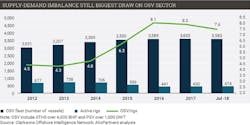Offshore staff
NEW YORK – Offshore supply vessel (OSV) companies need to take quick and decisive action to ensure their survival, according to consultant AlixPartners.
Despite the recovery in the oil price, the OSV industry remains under pressure, with charter rates for most types of vessels and in most offshore regions still at or close to operating cost levels.
There is a continued over-supply of vessels caused by over-ordering during the previous boom and easy bank credit, the consultant’s report found.
According to the analysis, the vast majority of the 38 companies studied face a high likelihood of bankruptcy in the next 12 months.
“It is abundantly clear that OSV operators need to face the music on the current state of the market and the real probability that we won’t be heading back to sustainable industry dynamics without a structural change to the sector,” said managing director Jeff Drake.
“Companies need to be disciplined about capacity management and do everything they can to reduce costs and increase operational efficiency.”
The number of active offshore rigs is still 33% lower than 2014 levels, declining to 474 in July from 706 in 2014, and present OSV day rates are still 40% lower than they were four years ago.
AlixPartners estimates that the global OSV market is currently oversupplied by about 1,150 vessels. Around 900 vessels are 15 years or older could be retired, as newer vessels are more efficient, cheaper to operate, and more aligned with environmental regulations.
One problem is that the largest operators control 30% of the fleet with the remainder belonging to 400 smaller operators with fleets of six or fewer vessels.
These small operators have little incentive to retire any of their own fleets or to take action that would benefit the sector overall.
Consolidation could address some of the apparent supply overhang while realizing cost synergies and in turn improving the sector’s value proposition.
The difficult actions required now to become more cost-competitive and to restructure balance sheets could, however, create stronger world-class companies that could not only survive the present crisis, but even thrive if the sector recovers, the authors conclude.
09/25/2018



